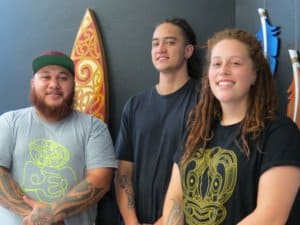
Off to Japan:
Counting down to an exchange trip to Japan are, from left Toihoukura tutor Henare Brooking with Sophie Klinge, a German student who moved to Gisborne from Auckland to study visual arts Māori, and fellow degree student Jayden Hokianga
A delegation from EIT’s Toihoukura School of Māori Arts are set to embark on a cultural exchange in Japan, where they will share and compare traditional tattooing styles – ta moko.
The group, comprising three tutors and seven degree students with speciality interests in ta moko, will be based in Kumumoto, where they will spend two weeks with indigenous tattooists, practising both traditional and contemporary Japanese styles.
“Their work is quite spectacular,” said tutor Henare Brooking. “They have some of the brightest colours in the world.
“We are particularly interested in the style called tebori where they use traditional tools and make traditional pigments from scratch,” he said.
“Our style is quite different – their work is full of realism and colour – ours is more linear, using curves and symbolism to depict life, nature and people.”
While in Kumumoto they will attend Japan’s most prestigious university, Kaeio, where they will deliver a presentation and demonstration, a lecture on their culture and the origins of ta moko. There will also be a kapa haka performance, which will be repeated when they join up with the New Zealand Universities rugby team, who will be at the university during their stay.
The group is taking a live canvas – student Mataroria Lemon – whose will receive a full back moko in collaboration with Horiren First, a leading tebori artist.
She will be making a return visit to Toihoukura in June or July to help finish this work.
Leading the exchange with Mr Brooking are Professor Derek Lardelli and tutor Makarini Solomon.
The delegation to Japan follows similar exchanges with indigenous people in Canada, Guam and San Francisco. It is supported with funding from Creative New Zealand.
